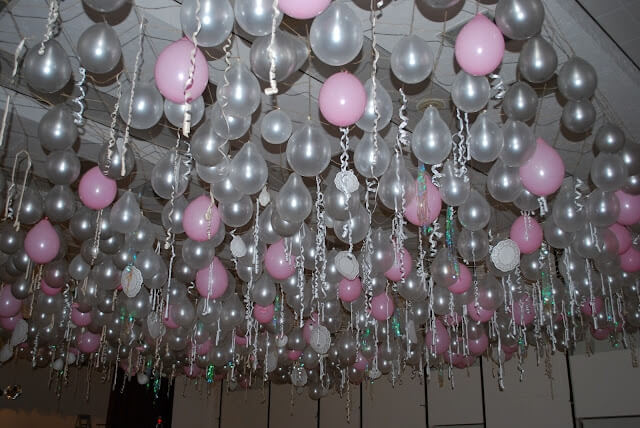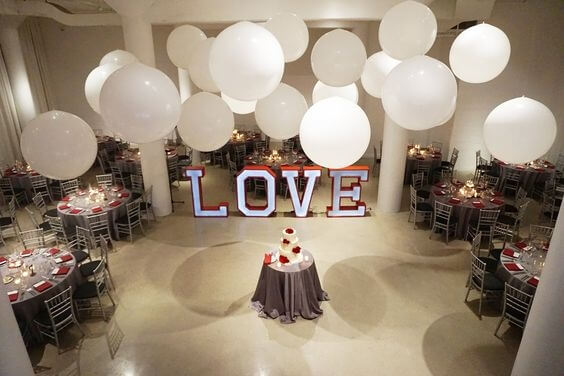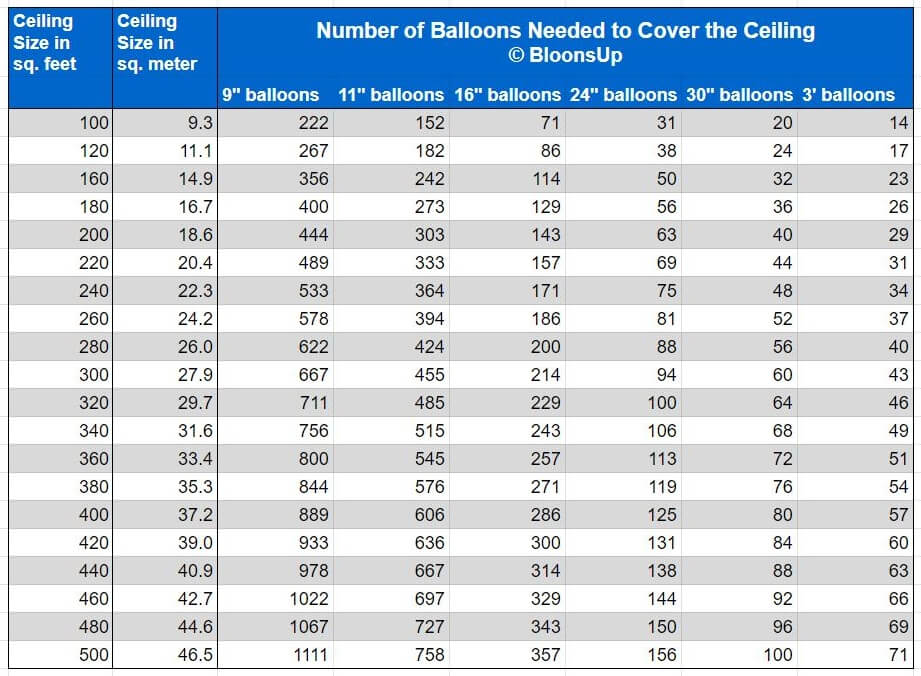How many balloons for an arch? Want a simple answer? Get my free calculator now!
- Home
- Balloon Decoration Ideas
- Balloons Hanging From Ceiling
Balloons Hanging From Ceiling
Ideas, How-to Guide, and Stunning Examples for Show Stopping Event Decor
Have you ever walked into a room with balloons hanging from the ceiling? It's like entering a land of mystery and wonder, and you can't help but cast your gaze upwards!
It seems I am not alone with this feeling. When I last counted, I had 17 questions about balloon ceiling decor in my FAQ section. So it's clearly a hot topic!
If you make a purchase through a link on my site, I may receive a small commission at no extra cost to you. I only recommend products that I believe to have good value (affiliate disclosure).
Let's settle these questions once and for all. I am going to show you how to create stunning balloon ceilings, with and without helium.
You'll also get a formula to calculate how many balloons you'll need to cover your ceiling.
Ready to take your events to new heights?
How Do You Hang Balloons From the Ceiling?
The most common way to hang balloons from the ceiling is by filling them with helium, which — when you let them go — makes them float up to the ceiling.
Attach color matching ribbons to the balloon neck and voilà, you have an eye-catching balloon ceiling decor.
 Who wouldn't want their venue enchanted with a balloon ceiling decor like this?
Who wouldn't want their venue enchanted with a balloon ceiling decor like this?While this method is arguably the easiest and quickest, it's also the most expensive. Depending on the size of the room, you need a good number of balloons. Which means you need a large amount of helium.
It might also be tricky to get the balloons to stay in place over a dance floor if they're filled with helium. Which brings us to our next question.
How Do You Attach Balloons to the Ceiling Without Helium?
There are several methods for hanging balloons without helium, ranging from easy to more advanced.
Let's begin with an easy technique: glue dots!
Blow up the balloons with air, tie a length of curling ribbon to them and then stick them to the ceiling with one to two adhesive dots.
This works best on smooth clean surfaces. On a rough surface, the glue dots may not stick. And you might not want to do it in a venue with high ceilings. Unless you have a long and sturdy ladder!
 Another benefit of using glue dots to attach balloons to the ceiling: You can arrange them in exactly the pattern you like.
Another benefit of using glue dots to attach balloons to the ceiling: You can arrange them in exactly the pattern you like.Next technique: fishing line and command hooks.
This means you'll hang the balloons upside down.
String one long piece of fishing line between two posts or chairs. Blow up your balloons with air and attach a 2 feet long piece of fishing line to each of them. Then tie the balloons onto the long string of fishing line.
Once your long piece has all the balloons you want on it, raise it up to the ceiling. Secure the long piece of fishing line with scotch tape every 2 feet or so and on the ends as well.
 Balloons hanging from the ceiling, upside down. For this method, there's no helium required. [Photo source: tuftsmission.blogspot.com]
Balloons hanging from the ceiling, upside down. For this method, there's no helium required. [Photo source: tuftsmission.blogspot.com]For the advanced decorator: Using quicklink balloons and magnets or command hooks.
Our third method for a balloon ceiling decor without helium isn't for the faint of heart, but the result is certainly worth it!
You create a structure made of quicklink and regular balloons, then suspend this kind of "hanging balloon wall" from the ceiling with fishing line and either ringed magnets or command hooks.
Let's take it step by step.
First, these are the materials you'll need:
- 11 inch Qualatex Quicklink balloons
- 11 inch regular latex balloons in the same color
- 5 inch latex balloons in the same color
- curling ribbon
- fishing line
- Clik-Clik magnets or similar magnets with a ring or hook (these only work if the ceiling has metal structures)
- alternatively use strong command hooks
- electric balloon pump
Next, watch this excellent video tutorial with Greg Brown and Natalie Saunders:

Finally, get cracking and build this stunning balloon ceiling decor yourself!
Sure, it takes longer to create than a helium filled balloon ceiling and you need some fixtures on the ceiling to attach the balloons to.
On the upside, you'll save a lot of helium and you'll be able to enjoy your beautiful ceiling decor for longer, as air-filled balloons last longer than helium-filled ones.
How Many Balloons Does it Take to Cover a Ceiling?
To calculate how many balloons you'll need for your balloon ceiling, you need to know the size of the ceiling, the size of the balloons and a bit of math. 😁
This formula works best for the helium balloon ceilings, but it will also give you a good approximation for the other methods we looked into.
Step 1:
Calculate the square footage of the ceiling you want to cover by multiplying ceiling length with ceiling width.
For example, a 20 feet (6 m) long by 10 feet (3 m) wide room would result in a 200 square-foot (18 square meter) ceiling area to cover.
Step 2:
Know how many square feet each balloon covers, depending on its size.
I've found different calculations, but this is the formula from Qualatex that I trust most:
11" balloon = 0.66 sq. ft. (613 cm2) covered by each balloon
16" balloon = 1.4 sq. ft. (1301 cm2) covered by each balloon
3’ balloon = 7 sq. ft. (0.65 m2) covered by each balloon
Step 3:
Now divide the square footage of the ceiling by the square footage of the balloon.
To cover our 200 square-foot ceiling from the example above with 11 inch balloons, we'd calculate:
200 sq. ft. divided by 0.66 sq. ft. = 303 balloons
Similarly, for 16 inch balloons it would be:
200 sq. ft. divided by 1.4 sq. ft. = 143 balloons
What if it's a different size of balloon? Or inflated to a different size? To calculate the square footage of a balloon of any size, do this:
Multiply the diameter of the balloon by itself, then deduct 20%. Why minus 20%? The balloons may not sit exactly 9, 11, or 16 inches apart as they tend to nestle into each other.
Example calculation for a 9 inch balloon:
9" x 9" = 81 sq. inch = 0.56 sq. ft.
0.56 sq. ft. minus 20% = 0.45 sq. ft.
Balloon Ceiling Chart
In case math isn't really your thing, here's a balloon ceiling chart that gives you the approximate number of balloons needed to cover a ceiling, for the standard balloon sizes and ceiling areas from 100 to 500 square feet.
Do you have to tightly pack the balloons on the ceiling to achieve the desired jaw-dropping effect? With the smaller balloon sizes, I would say yes.
 Balloon Ceiling Decor at a Wedding Reception [Source: balloonsbytommy.com]
Balloon Ceiling Decor at a Wedding Reception [Source: balloonsbytommy.com]With larger balloons however (30" or 3'), it's fine to give them room to breathe.
Create a stunning visual display by suspending them at varying heights, just like the beautiful balloon ceiling seen in this example.
To wrap it up, here are some related questions around the topic of balloons hanging from ceiling:
Click on each link to read the answer! 👇
How do I hang balloons upside down in clusters at my reception?
How would you hang balloon decors in a ceiling?
How do I suspend balloons without damaging the ceiling?
How to hang foil balloons from ceiling?
Best way to hang balloons from a vaulted ceiling
How can I make balloons hang heavy from the ceiling?
Wanted: Tips on Hanging Balloon Columns from a ceiling
How do i hang a framed balloon heart to a ceiling?
Making a false ceiling to hold helium balloons
What are the best suggestions for mounting balloons onto walls and ceilings?







Have your say about what you just read!
Leave me a comment in the box below. Don't see the comments box? Log into your Facebook account, give Facebook consent, then return to this page and refresh it.